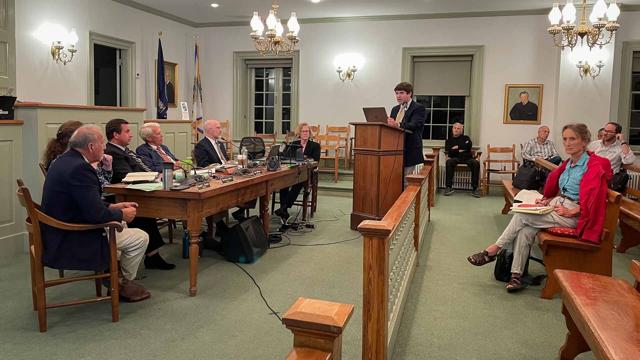
high-speed broadband glass fibre internet cable
All Points needs more time, money
A regional broadband project promising affordable high-speed internet in Rappahannock and seven other counties will be delayed by one year, All Points Broadband CEO Jimmy Carr said in an interview Monday.
All Points is reporting no completed construction to date in Rappahannock County — the project, which was awarded funding in 2022, was initially scheduled for construction completion in Rappahannock and the other participating counties by mid-2025. Now the updated timeline shows completed construction by June 2026. In order to meet this deadline, All Points had to change its installation plans, which requires more funding.
All Points did report some completed construction in Augusta and Fauquier counties, saying the first users in Augusta could be connected by the end of this month. In Rappahannock, Rockingham, Clarke, Frederick, Page and Warren counties, All Points is focused on design work and planning.
Following construction completion, households and businesses can then arrange connections. These connections will continue on a rolling basis through June 2026 and in the months after, Carr told the Rappahannock News and Foothills Forum. This phase will likely begin in September 2025, he said.
Officials from All Points will update the Rappahannock County Board of Supervisors on the project’s progress at the supervisors’ Jan. 6 meeting at the county courthouse.
All Points, along with the Northern Shenandoah Valley Regional Commission (NSVRC), Rappahannock Electric Cooperative (REC) and Dominion Energy are working to bring universal broadband to the counties using state and federal funding awarded from the 2022 Virginia Telecommunications Initiative (VATI) grant.
“I share the disappointment felt by our community about the project’s one-year setback,” Chair and Wakefield Supervisor Debbie Donehey wrote to the Rappahannock News. “It’s crucial that our citizens have access to high-speed internet. All Points Broadband has consistently warned us about managing expectations for this significant endeavor.”
There’s much more at stake than lost time: $96 million in federal support came from the American Rescue Plan Act (ARPA), which stipulates that U.S. funds unspent by the close of 2026 must be returned to the federal treasury. If that happens, the opportunity to build Rappahannock’s near-universal broadband coverage turns into a broken promise.
“That will not happen,” Carr insisted in an interview.
Rappahannock County Administrator Garrey Curry stated later, “We have been assured that the project will be complete in advance of the ARPA deadline.”

graphic: all points broadband progress update
In Fauquier County, 29.02 miles of fiber has been completed out of a planned total of 575 miles, and in Augusta County, 48.52 miles of fiber has been completed out of a planned total of 424.78 miles.
“Notwithstanding everything we have done, things are still not moving as quickly as we all want them to, and we wanted to get ahead of the potential risk about not finishing by the end of 2026,” Carr said. “We didn’t want to wait until it was too late to do something about that, and we’re trying to be very proactive in managing exactly that risk.”
However, the eight-county project involves multiple players, public and private, and neither the counties nor All Points fully controls the process as it unfolds. Part of what slowed progress so far were the arduous permitting requirements for extending the fiber optic lines along existing poles used for telephone and electric wires.
To minimize those delays, All Points opted to increase the portion of the fiber line that would be laid underground to about 60% from the previously planned 40%. But the underground lines are more expensive to install, and also carry their own permitting requirement — these from the Virginia Department of Transportation.
Carr said by the fourth quarter next year, “service will be available in some portions of all eight counties,” a year later than originally envisioned.

BOS-All-Points-7pm-web.jpg
All Points CEO Jimmy Carr presents to the Rappahannock County Board of Supervisors in September 2021.
All Points will seek more funding
All Points will apply early next year for additional funds through the federal Broadband, Equity, Access and Deployment (BEAD) program, a part of the Biden administration’s infrastructure bill, and will know in the spring if it received additional funding.
Within the eight counties, there are an estimated 26,000 locations that would be eligible for the infrastructure funding, Carr said.
Carr and NSVRC Executive Director Brandon Davis shared the updated timeline at a meeting Monday with the eight-county “project team” at the regional commission office in Front Royal. The Rappahannock News and Foothills Forum were not permitted access to the meeting in order to allow project partners to freely ask questions, Davis said, but received the presentation from Carr via email.
‘A once in a lifetime opportunity’
Two and a half years ago, when Rappahannock County signed on for the ambitious eight-county broadband plan — almost entirely funded by federal COVID-relief money — Donehey called it “a once-in-a-lifetime opportunity.”
Hampton Supervisor Keir Whitson had said it would be “malpractice” for him to not vote in favor of the project.
“It’s a big project. I get that there will be delays,” Whitson said in a Tuesday interview. “I remain in a position where I’m giving All Points Broadband the benefit of the doubt.”
The plan initially envisioned 3,761 miles of fiber optic line stretching across the counties, providing high-quality broadband services to 41,690 users, including 695 businesses and community anchors. The American Rescue Plan Act (ARPA) — designed to jumpstart an ailing post-pandemic economy — provided the financial engine for the project — $96.9 million that the Virginia Department of Housing and Community Development would dole out to All Points Broadband.
From the beginning of the project, it was clear that as a multi-party, public-private development project, the plan presented more complexities than would be found in a simple contract between the county and the company installing the fiber optic lines and connections. Whitson noted at the outset that there was “a risk to the extent that we don’t have full and complete control over the government agency and private entities that are delivering the system to us.”
That said, the county’s financial exposure is limited: with more than $96 million flowing in from the ARPA bill, the county pledged only $5.9 million for the project, none of it requiring new taxes on county residents. Washington resident Chuck Akre and his FAGUS Foundation put up $3.5 million, the PATH Foundation granted $1 million, the county earmarked $715,768 of the ARPA money it had received and the Rappahannock County Public Schools threw in $370,000. An anonymous matching grant mobilized $150,000 in donations, effectively generating $300,000 for the project. Meanwhile, monies waiting to be deployed for the fiber lines are earning interest in special accounts.
Payments by the county are tied to progress reports from All Points, detailing accomplishments and reimbursable expenses. These are filtered through the Northern Shenandoah Valley Regional Commission, which serves as fiscal agent for the entire project. So far, Curry said, “There has been one payment requested when low-level design was completed.”
Two skeptics — Piedmont Supervisor Christine Smith and former Jackson Supervisor Ron Frazier — long complained that they hadn’t been informed of such details as exactly when and where the fiber lines would be installed.
“With all the ‘red flags’ associated with this project it is amazing that the Board majority proceeded with it,” Frazier wrote in an email to the Rappahannock News. “Yet it was the same way in seven other counties as well … So, with NO definitions of what ‘universal coverage’ is and no plans showing where the lines were to be built, we will get whatever [All Points] says we will get; and obviously whenever they say we will get it.”
Smith said she hopes the Board of Supervisors will consider an addendum to the contract that includes performance standards, hard deadlines and a reduced cost for internet service each month the project is delayed — an arrangement recently made by All Points with the Culpeper Board of Supervisors, which is in a separate project.
“It’s interesting because early on we talked about not putting all of our eggs in one basket and diversifying the effort, yet somehow we ended up with all of our eggs in the All Points Broadband basket, and in that approach, other options have peeled away,” Smith said.
Smith said that some residents in her district have had good luck using Starlink and other local providers.
The project planners are hopeful that the Biden administration’s infrastructure law, with $1.48 billion earmarked for Virginia, will help finance miles of underground fiber lines, enabling the project to cross the finish line in time to avoid a clawback of ARPA funds.
Whitson said that when All Points visits the supervisors in January, he will ensure that the fiber rollout is not an “all or nothing” plan.
“I think it would benefit people at least to have the opportunity for some of our citizens to experience the fiber soon, rather than later,” Whitson said.
Tim Carrington is a reporter for Foothills Forum, an independent, community-supported nonprofit tackling the need for in-depth research and reporting on Rappahannock County issues.
Julia Shanahan is editor of the Rappahannock News.






